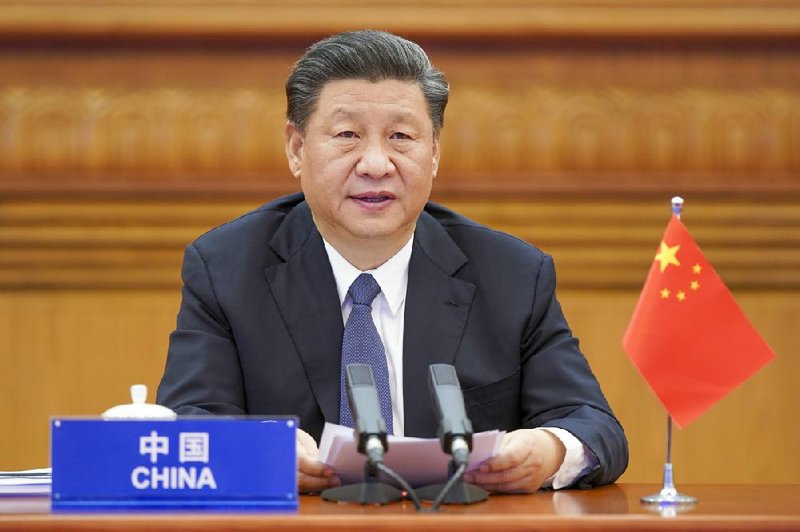WASHINGTON -- For weeks, President Donald Trump and Secretary of State Mike Pompeo used the terms "Chinese virus" and "Wuhan virus" in public and said they intended to hold Beijing responsible for the coronavirus pandemic.
Now, they have avoided using those phrases, and the administration is welcoming planeloads of medical equipment from China. On Wednesday, Trump described his relationship with President Xi Jinping of China.
"The relationship with China is a good one and my relationship with him is really good," Trump told reporters. The president added that he "will always assume the best" of China's leaders. Asked whether U.S. intelligence agencies have assessed that China falsified case and fatality numbers over the virus, Trump said, "I'm not an accountant from China."
Washington and Beijing were at each other's throats for weeks over the outbreak, which began in Wuhan, China, and was initially covered up by Communist Party officials.
[CORONAVIRUS: Click here for our complete coverage » arkansasonline.com/coronavirus]
But in recent days, the two sides have settled on a truce. They have agreed to look for ways to cooperate to slow the contagion.
Some U.S. officials had recognized that the deteriorating state of relations was impeding global efforts to fight the pandemic. Several of Trump's aides quietly reached out to Chinese officials through American businessmen with extensive ties in China, according to people familiar with the efforts.
National security officials and China hawks in the State Department are skeptical the detente will last, but several top advisers to Trump have advocated restraint -- notably Jared Kushner, Trump's son-in-law; Steven Mnuchin, the Treasury secretary; and Larry Kudlow, the director of the National Economic Council.
They argue that the two superpowers need to work together to suppress the virus, resuscitate the global economy and not jeopardize a trade deal that the two nations reached in December.
[Video not showing up above? Click here to watch » https://www.youtube.com/watch?v=teDK_qVWGIE]
Kushner worked with Chinese officials to arrange a series of shipments of purchased protective gear for medical workers, the first of which arrived in New York on Sunday. The partnership between the government and several of the nation's largest health care distributors is expected to funnel much-needed masks, gowns and protective gear to hospitals in the coming weeks.
Chinese officials are trumpeting the truce while denouncing Pompeo; Peter Navarro, a hawkish trade adviser, and other U.S. officials who have continued to criticize China. Representatives of the Chinese Foreign Ministry have referred constantly to the telephone call between Trump and Xi in news conferences in Beijing.
"The two heads of state agreed that under current circumstances, China and the U.S. should stand united and fight covid-19," Hua Chunying, a spokeswoman for the Chinese Foreign Ministry, said Tuesday, referring to the disease caused by the virus.
She noted that Ma Xiaowei, the minister of China's National Health Commission, spoke Monday with Alex Azar, secretary of health and human services, "to exchange ideas on the two countries' pandemic prevention and control efforts."
In a Cabinet-level meeting last week, administration officials approved a draft rule that would extend export control restrictions to foreign companies that use American technology, a measure aimed at choking off supplies to Huawei, the Chinese technology company. The move still needs Trump's approval.
And on March 26, Trump signed into law an act that requires the United States to lend stronger diplomatic support to Taiwan, the self-governing democratic island claimed by China. A Chinese Foreign Ministry spokesman, Geng Shuang, said the United States should "correct its mistakes" or "inevitably encounter a resolute strike back by China."
U.S. intelligence officials also assess that as the Chinese government retreats from its overt anti-American messages involving the virus, it is likely to continue to push those online by covert means.
But asked about it Monday on Fox News, Trump dismissed that official assessment of China's disinformation campaign. "They do it and we do it and we call them different things," he said. He added that "every country does it" before denouncing The New York Times and The Washington Post, which had written about the anti-American disinformation campaigns, as "dishonest" and "corrupt."
"Actually this is smart," said Orville Schell, director of the Center on U.S.-China Relations at the Asia Society. "Isn't that the only way to do it? You cooperate where you share interests and you compete and criticize where you don't. We did it with the Russians in the Soviet days and got some things done."
A Section on 04/03/2020
